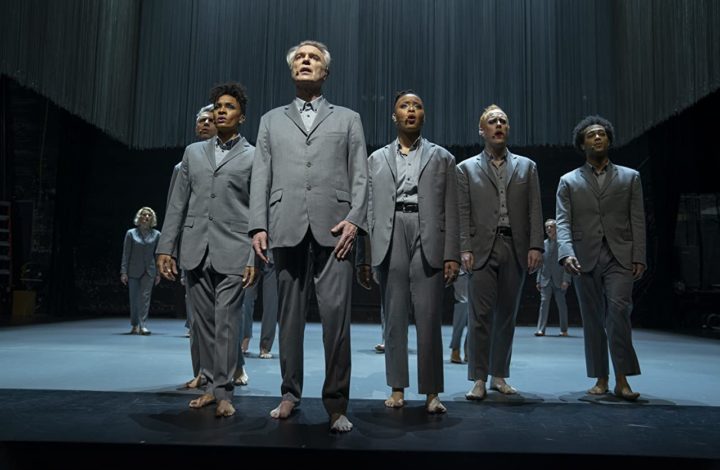
MPAA Rating: NR | Rating: ★★★★
Release year: 2020
Genre: Documentary, Music, Musical Director: Spike Lee
Before ever pursuing pastoral ministry or academia, I wanted to be a professional musician—a drummer, to be precise. There is something about the music produced by percussion instruments, how striking an object with sticks or hands in consistent rhythm can generate a powerful affective response in us as human beings. Percussion is so simple, yet can be so creative and unique. A shake, a scrape, a strike, a strum—these are basic, primordial human sounds and movements which can produce musical beauty. Every single world culture has percussion instruments, and every generation, young and old, can appreciate the wondrous sensation of musical sounds performed in tight, even tempo. Percussion instruments, such as the cymbal and timbrel, are also consistently featured in the Bible as central to celebratory worship of God. And so the Spike Lee-directed documentary of Talking Heads’ frontman David Byrne’s Broadway show, David Byrne’s American Utopia, is like a glimpse of heaven, where every tribe, tongue, and nation comes together to sing in rhythmic praise and joy. It’s a percussionist’s paradise which demonstrates a perfect rhythm between effervescent joy and no-nonsense political urgency.
Where the Jonathen Demme-directed 1984 film featuring Talking Heads, Stop Making Sense, is a transcendent work of cinematic jubilance (albeit with an underlying melancholy), American Utopia is much more sobering and urgent in its political appeals. The older Byrne who once asked “what am I doing here?” is now pleading for audiences to vote, to wake up to climate change, to start making sense. When Byrne and his bandmates declare “say his/her name” in a powerful rendition of Janelle Monae’s “Hell You Talmabout,” they sing it like it’s a divine commandment. As an image of Colin Kaepernick kneeling is projected onto the wall of chains surrounding the bare stage, and the musicians all kneel in solidarity, American Utopia‘s political allegiances become unmistakable. Where Stop Making Sense was more subtle or parabolic in its critique of a self-destructive American ideology, American Utopia is quite direct and conspicuous. In this sense, this is clearly a Spike Lee film, a director not known for being subtle or ambiguous in his prophetic cinematic diatribes against American social injustices. Whether this is a benefit or hindrance is probably dependent upon the audience’s own political views; Byrne and Lee are directly preaching to the choir, and so while those who agree with their stances are certain to experience an emotional boost (as I did), I imagine the film is unlikely to make any new converts.
Beyond American politics, the musical performances of American Utopia are remarkable for their collaborative spirit. The twelve barefoot musicians all wear the same grey suits and march around the empty stage in what seems like effortless and spontaneous movements, yet are clearly well-choreographed and perfectly in sync with the lighting and one another. Bryne often speaks with the audience in between songs; in one of these liminal asides, he comments on how what captures our attention the most is not objects or nature, but other human beings. As such, Bryne has removed all distractions from the human beings on stage–there are no wires or speakers, no microphone stands or monitors. The musicians carry their instruments as if part of a marching band (indeed, I had flashbacks to my own experiences of drumlines and marching bands in high school). If the stage setup for Stop Making Sense was simple and sparse, the stage for American Utopia is literally empty. Yet this emptiness is not a sign of desolation, but of vibrancy—it allows for Byrne’s performers and Lee’s cameras to weave in and out amongst one another in rhythmic fusion, a beautiful heavenly display of what it looks like for human beings to work together in community for a greater common good. And so when the smiling and singing performers march off the stage and gambol through the theater in the finale, it’s a tiny eschatological view of heaven coming to earth, as if the on-stage joy can’t help but spill over into the rest of creation and transform us all for the better.
IMDB Listing: https://www.imdb.com/title/tt11874226/
A wonderful review. Like you, I am a minister (non-denominational Protestant). However, unlike you, I am actually a drummer (I had my first band at 13, and played in a Genesis cover band for three years later in life).
I agree with you on all points in your review, both theological and musical. I would only add that, as good as Mr. Lee’s film is (and it may well be the greatest film ever made of a musical), there is nothing like seeing the musical live. It enhances all of what you say – and then some. At the risk of being cliche, it is, quite simply, transcendent. Both because the effect of the drumming (and other instruments) is physically palpable, and because the power of the performance is even more visceral.
The show is only on Broadway for a couple of more weeks (4/3). I highly recommend that anyone who hasn’t seen it run, don’t walk, to Broadway to see it. The spiritual uplift is extraordinary.